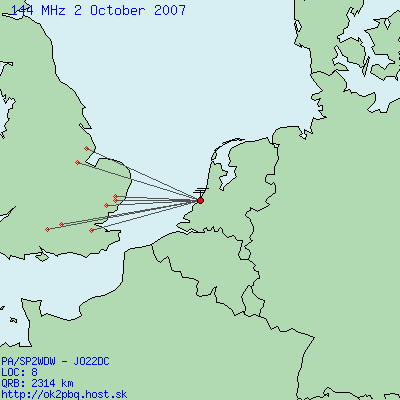The contest beginning coincided with the football match Germany-Argentina. As a result, mainly contest stations from DL were heard while most casual ops seemed to enjoy beer in front of their TVs.
The evening provided nice tropo ducts over the Baltic Sea, but overall activity from Scandinavia was rather low. Many OZ stations were worked, but the highlight was OH1ND at 732 km, who spotted me on the cluster while I worked in the opposite direction. There were quite many stations from LY and YL. EW6FS complemented that sector.
The activity of SP stations was truly disappointing. The map shows very clearly where one should point his antennas during VHF contests from JO94.

The ODX was, as usual, DR9A at 913 km, audible throughout the entire 24-hour period.
Overall 237 QSOs were completed.








